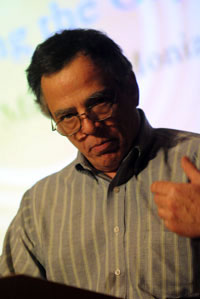
Phil Farnsworth
Michael Moniz
Position
Associate Professor
Affiliated Departments
Telephone
617-747-8472
For media inquiries, please contact Media Relations
Career Highlights
- Trombonist
- Founder of Schoolhouse Music Services and MIDI Schoolhouse
- Former public school music educator/administrator
- Adjunct professor for Salem State College
- Professional development provider
- Consultant/technology trainer for the Massachusetts Elementary School Principals Association and the Northeast Consortium for Staff Development
- Former technology chair for the Massachusetts Music Educators Association
- Instructor for the Technology Institute for Music Educators
- Presented numerous music technology sessions at the Christa McAullife Technology Conference, the New England League of Middle Schools, the TI:ME National Conference, and the New England Band Directors Association, as well as state music educator conferences in Texas, Massachusetts, Georgia, Kansas, Pennsylvania, Rhode Island, Vermont, Maine, Connecticut, New York, and New Hampshire
Education
-
School NameBoston UniversityState or ProvinceMassachusettsDegreeBachelor of Music (B.M.)Field of StudyMusic EducationDate Degree Received
-
School NameBridgewater State CollegeState or ProvinceMassachusettsDegreeMaster of Education (M.Ed)Field of StudyEducation Administration
In Their Own Words
